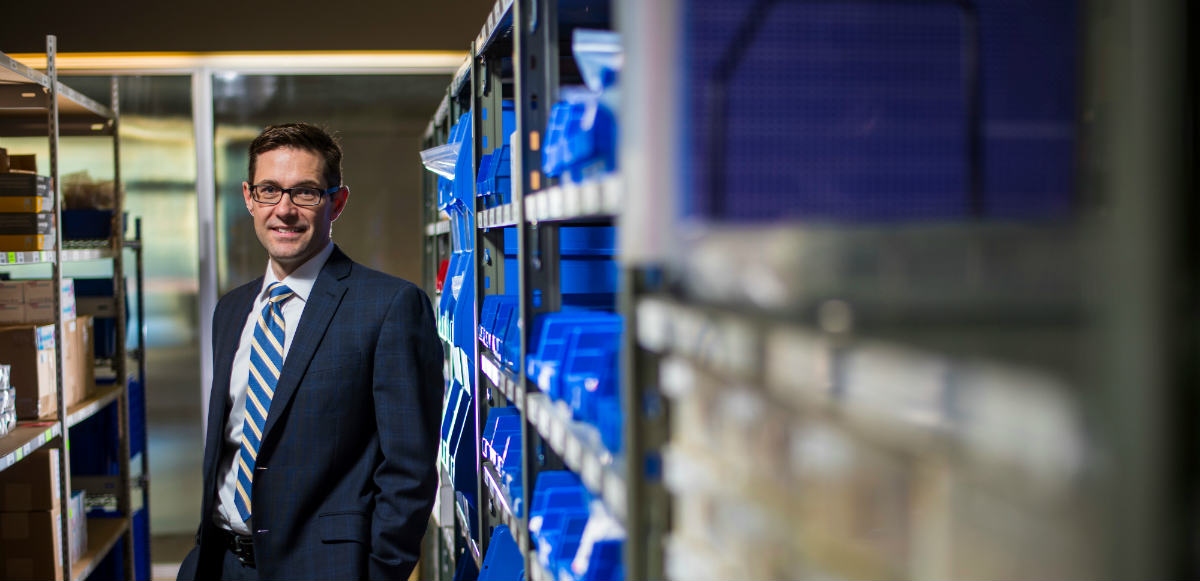
Patrick Haney in Keir Surgical's Vancouver warehouse.
Making vice president of a successful company by age 29 may sound like the pipe dream of a starry-eyed undergrad on the first day of business school, but for Patrick Haney ('98 BSc, '08 MBA), it was just one of several milestones passed over the course of his career in the Canadian healthcare industry.
In fact, Haney is the first to point out that it wasn't dreams that got him to where he is today-it was passion, tenacity, and a heck of a lot of hard work.
"I don't think most people's experience is that they wake up one morning and create Facebook," explains Haney. "I think we hear too many commencement speeches that tell us that's how it should happen, but the truth is that there are a lot of great ideas, and it's really the hard work that makes them come to fruition."
Haney's hard work has taken him a long way. After graduating from the U of A in 1998 with a degree in genetics, he spent a few years working in the U.S. getting his feet wet in sales before he saw an opening at Keir Surgical for a new salesperson based in Calgary. Thinking it could be a stepping stone on his way to a profitable career in pharmaceutical sales, he applied for the position and joined the company as a sales representative in 2000.
As it turned out, surgical instrument sales were a far cry from pharmaceuticals-and Haney quickly learned that a surgeon buying instruments for her own use is a very different customer from a clinician shopping on behalf of his patients.
"I think that there are different ways to be an entrepreneur, and it doesn't have to mean being part of a startup."-Patrick Haney
"The instrument a surgeon chooses is very important to how they perform surgery day in and day out and the confidence they have with that product," Haney explains. He uses the analogy of a carpenter, who might select his own hammer with more care than a floor finishing for the house he's working on. "There is a different level of interest and attention."
After working his way up from sales rep to territory manager, Haney was invited to move to Vancouver to work more closely with his then-boss Michael Fish.
"When I moved to Vancouver in 2003, one of the first things Michael and I did was expand the company into Ontario and Quebec," says Haney. "We moved east, which is kind of swimming upstream for most companies in Canada." The move was ambitious for the small Western Canadian company, but for Haney and Fish, the potential reward outweighed the risk.
Now full partners, the pair have since acquired several other companies to make up what is now Pacific Surgical, a national company made up of six businesses, all Canadian owned and operated. Of these, Haney runs three in the role of president-Keir Surgical, Mobile Instrument Service and Repair, and Conkin Surgical Instruments-though he is quick to downplay the titles.
"In total, we have about 85 employees in of all of our companies-so we're still a small company in the grand scheme of things. Being part of a small company means you can wear a lot of different hats, and you're not limited in what you get to challenge yourself with if you're inclined to do so," he says. "In a lot of ways, those promotions were more reflections of the fact that I was doing different things in the company and just taking on more responsibility, not because somebody else had abdicated the position."
Despite his role in the success and growth of his companies, Haney doesn't think of himself as an entrepreneur in the traditional sense. "I think the word entrepreneurship is a challenging one. I think that there are different ways to be an entrepreneur, and it doesn't have to mean being part of a startup. You can still be entrepreneurial even if it's in more stable business."
This fall, Haney returned to his alma mater to share some of his sales expertise with students in the Science Internship Program. His presentations emphasized the value of communication and being able to "sell" your degree.
"There's no question that people hold a science degree in high regard," he explains. "The degree itself holds its own weight, but you've got to know how to sell it."
And fittingly, Haney's tips on how to market yourself sound a lot like tips for running a business: "Don't be timid about it. Get excited, get out of your comfort zone. Take calculated risks and remember the ABC of sales-Always Be Closing!"